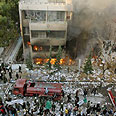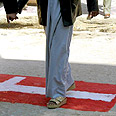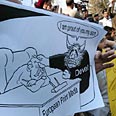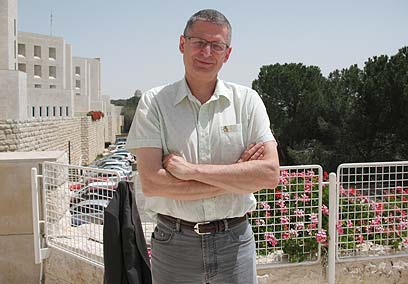


Muhammad cartoons editor: There's a problem with Muslims in Europe
Flemming Rose, culture editor of Danish paper that published cartoons of Muslim prophet which led to riots, says clashes were attempt by Muslims to impose Islamic law on non-Muslim countries. He tells Ynet way to fight intolerance is by freedom of expression, not by limiting it
Flemming Rose, culture editor of the Danish newspaper Jyllands-Posten which published 12 cartoons depicting the Muslim Prophet Muhammad in 2005 that led to an outbreak of riots in the Muslim world in which over 50 people were killed, says he feels no remorse for his decision – but could not give a straight answer as to whether he would do it again.
Rose is currently in Israel as guest of the Hebrew University of Jerusalem. In an interview with Ynet on Tuesday he said, "If I said I wouldn't do it again, it would send a very bad message to those who committed crimes and intimidations, and would in fact be telling them: If you keep this up, we will do whatever you want.
"If I do say that I would publish the cartoons again, in light of what happened, people will think I am cynical and don't consider the repercussions of my actions. It's like asking a rape victim if she regrets wearing a revealing shirt for a Friday night out."
The crisis that was dubbed "the Muhammad cartoons controversy", broke out in two rounds. The first was in 2006, after Muslim clerics spoke out against the publication of the 12 Muhammad cartoons in Denmark. The second time was in February 2008, after no less than 18 different newspapers published the most famous of the drawings, that depicted the prophet with a bomb in his turban, in response to a foiled attempt on the lives of the illustrators.
'Don't just tell the story - show it'
When asked why he decided to publish the cartoons, Rose said, "Not to insult the Muslims. It was in response to the spreading self censorship with regards to Islam. It started with a discussion on a children's books about Muhammad, whose author could not find an illustrator for it. One person was willing to do the drawings, but demand to remain anonymous, and later admitted this was out of fear of the Muslims' reactions.
Flemming Rose wants freedom of expression (Photo: Nir Magal)
"The publication also came after the murder of Dutch director Theo van Gogh at the hands of a Muslim (in response to his film about the Islam's attitude towards women), and the assault of a non-Muslim professor in Denmark after reading from the Quran to his class in the university.
"It's a classic journalistic case, you hear about a problem and want to find out if it really exists. We decided that, instead of describing it in words, we can let the cartoons demonstrate it and prove that they cannot be censored. It's an age-old journalistic principle: Don't settle for telling the story, but also show it."
When asked if he had anticipated the Muslim world's reaction, Rose said, "No one expected this." He pointed out that cartoons of the Prophet Muhammad had been published in the past in Danish newspapers, and he was even depicted as mentally ill in one of them, that did not lead to protests.
"There are even experts on Islam who didn't see this coming," he said. "I talked about it with the orientalist Bernard Lewis, who told me there was a long culture of insulting the prophet in Europe. He referred me to Dante, and the cathedral in Bologna where Muhammad is depicted in hell. Muslims didn't respond to that, because they said it these were heretics that they shouldn't be concerned with."
'Muslims don't want to be integrated'
When asked why he thought Muslims reacted so harshly this time, Rose said, "According to Lewis, this is the first time Muslims try to impose Islamic law on non-Muslim countries."
Former Mossad Director Efraim Halevy, who heads the Hebrew University's Shasha Center for Strategic Studies and will host the open discussion to which Rose was invited on Wednesday, said, "They were actually trying to politicize a religious issue."
According to Rose, the riots that broke out following the publications stemmed from "Muslim immigration to Europe and the fact that there are Muslims who don't want to be integrated… There's a problem with Muslims in Europe and it must be dealt with – but limiting freedom of expression is not the solution.
"There are those who viewed the cartoons that I published as a form of incitement, but I don't think a statement should be measured by the response it yields, especially if the response is irrational and stupid."
Rose said it was paradoxical that Arabs and Muslims were "mad at us, when you look at the cartoons they publish in their newspapers. We have also published some of them, but only to discuss them, and not to give them support."
The editor said he and his newspaper had apologized to the Muslims who took offense to the cartoons, but stressed that he could not apologize for the publication itself. With regards to his personal life, he said nothing has changed.
"Denmark is a peaceful country. There was a time after the crisis that I had to take extra precautions, but that is in the past. I never felt threatened – or that I have to be silent."
'Mein Kampf should also be published'
When asked if he supports the positions of right-wing politicians throughout Europe, such as the Dutch Geert Wilders, who called for a stop to Muslim immigration, Rose said, "No. Wilders talks about things that most politicians are afraid to talk about, and there are other parties like his in Europe. They pop up precisely because it's not talked about enough."Rose said he does not agree with the way Wilders generalizes in his reference to Muslims, but said he could not speak out against a man who was threatened because of his opinions: "Limiting freedom of expression is not the solution, so we also cannot prohibit the publication of books such as the Quran, as Wilders suggestion, or even Mein Kampf.
"We cannot fight intolerance by limiting freedom of expression, but with the freedom of expression. I see no contradiction between the two. Expression cannot be limited, because then it will only make what we are trying to silence more intriguing."















